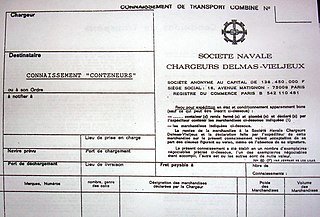
A boat or ship engaged in the tramp trade is one which does not have a fixed schedule, itinerary nor published ports of call, and trades on the spot market as opposed to freight liners. A steamship engaged in the tramp trade is sometimes called a tramp steamer; similar terms, such as tramp freighter and tramper, are also used. Chartering is done chiefly on London, New York, and Singapore shipbroking exchanges. The Baltic Exchange serves as a type of stock market index for the trade.
"Demurrage" in vessel chartering is the period when the charterer remained in possession of the vessel after the period normally allowed to load and unload cargo (laytime). By extension, demurrage refers to the charges that the charterer pays to the ship owner for its delayed operations of loading/unloading. Officially, demurrage is a form of liquidated damages for breaching the laytime as it is stated in the governing contract. The demurrage sometimes causes a loss to the seller as it increases cost of the total freight.
Fundamental breach of contract, is a controversial concept within the common law of contract. The doctrine was, in particular, nurtured by Lord Denning, Master of the Rolls from 1962 to 1982, but it did not find favour with the House of Lords.
Shipbroking is a financial service, which forms part of the global shipping industry. Shipbrokers are specialist intermediaries/negotiators between shipowners and charterers who use ships to transport cargo, or between buyers and sellers of vessels.
Chartering is an activity within the shipping industry whereby a shipowner hires out the use of their vessel to a charterer. The contract between the parties is called a charterparty. The three main types of charter are: demise charter, voyage charter, and time charter.
A charterparty is a maritime contract between a shipowner and a "charterer" for the hire of either a ship for the carriage of passengers or cargo, or a yacht for leisure.

USS Alhena (AKA-9) was an attack cargo ship named after Alhena, a star in the constellation Gemini. Robin Kettering had been purchased from Robin Line of the Seas Shipping Company some four months after launch and served as a commissioned ship for five years and four months. On 12 September 1946 the ship was transferred to the War Shipping Administration and placed in reserve until repurchased by Seas Shipping for operation as Robin Kettering. In 1957 the ship was sold, renamed Flying Hawk operating in cargo—passenger service until sold for scrap in 1971.

USS Adria (AF-30) was an Adria-class stores ship in service with the United States Navy from 1944 to 1954. She was scrapped in 1977.
Affreightment is a legal term relating to shipping.

Hong Kong Fir Shipping Co Ltd v Kawasaki Kisen Kaisha Ltd [1962] 2 QB 26 [1961] EWCA Civ 7 is a landmark English contract law case. It introduced the concept of innominate terms, a category between "warranties" and "conditions".
Suisse Atlantique Societe d'Armament SA v NV Rotterdamsche Kolen Centrale [1967] 1 AC 361 is a landmark English contract law decision of the House of Lords, concerning the notions of fundamental breach of contract and inequality of bargaining power.

Maredelanto Compania Naviera SA v Bergbau-Handel GmbH or The Mihalis Angelos [1970] EWCA Civ 4 is an English contract law case, concerning breach of contract.
Jackson v Union Marine Insurance (1874) 10 Common Pleas 125 is an early English contract law case concerning the right to terminate an agreement.
A shipping agency, shipping agent, or ship agency is the term used to refer to the appointed companies that handle operational and procedural (legal) requirements for a commercial vessel's call at a port for the purposes of cargo handling (loading/discharging), emergency calls, repairs, crew changes, or ship demolition, and protect the general interests of their principals on behalf of ship owners, disponent owners, or charterers in an objective manner.

Valemax ships are a fleet of very large ore carriers (VLOC) owned or chartered by the Brazilian mining company Vale S.A. to carry iron ore from Brazil to European and Asian ports. With a capacity ranging from 380,000 to 400,000 tons deadweight, the vessels meet the Chinamax standard of ship measurements for limits on draft and beam. Valemax ships are the largest bulk carriers ever constructed, when measuring deadweight tonnage or length overall, and are amongst the longest ships of any type currently in service.

A bill of lading is a document issued by a carrier to acknowledge receipt of cargo for shipment. Although the term is historically related only to carriage by sea, a bill of lading may today be used for any type of carriage of goods. Bills of lading are one of three crucial documents used in international trade to ensure that exporters receive payment and importers receive the merchandise. The other two documents are a policy of insurance and an invoice. Whereas a bill of lading is negotiable, both a policy and an invoice are assignable. In international trade outside the United States, bills of lading are distinct from waybills in that the latter are not transferable and do not confer title. Nevertheless, the UK Carriage of Goods by Sea Act 1992 grants "all rights of suit under the contract of carriage" to the lawful holder of a bill of lading, or to the consignee under a sea waybill or a ship's delivery order.
Seaworthiness is a concept that runs through maritime law in at least four contractual relationships. In a marine insurance voyage policy, the assured warrants that the vessel is seaworthy. A carrier of goods by sea owes a duty to a shipper of cargo that the vessel is seaworthy at the start of the voyage. A shipowner warrants to a charterer that the vessel under charter is seaworthy; and similarly, a shipbuilder warrants that the vessel under construction will be seaworthy.
The law of carriage of goods by sea is a body of law that governs the rights and duties of shippers, carriers and consignees of marine cargo.






